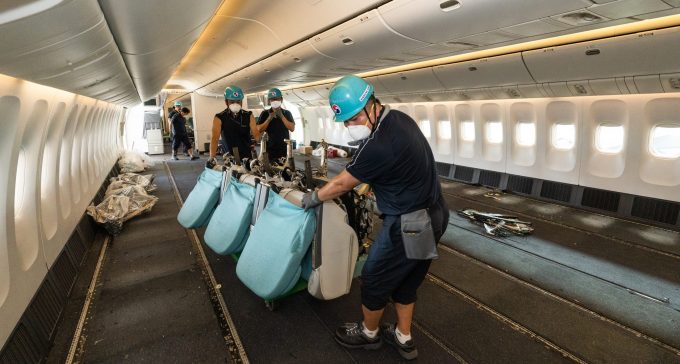Freighter aircraft: 'we are on the cusp of major change in large widebodies'
Even with 21% of the fleet parked, freighters will continue hauling a large share of ...
TFII: SOLID AS USUALMAERSK: WEAKENINGF: FALLING OFF A CLIFFAAPL: 'BOTTLENECK IN MAINLAND CHINA'AAPL: CHINA TRENDSDHL: GROWTH CAPEXR: ANOTHER SOLID DELIVERYMFT: HERE COMES THE FALLDSV: LOOK AT SCHENKER PERFORMANCEUPS: A WAVE OF DOWNGRADES DSV: BARGAIN BINKNX: EARNINGS OUTODFL: RISING AND FALLING AND THEN RISING
TFII: SOLID AS USUALMAERSK: WEAKENINGF: FALLING OFF A CLIFFAAPL: 'BOTTLENECK IN MAINLAND CHINA'AAPL: CHINA TRENDSDHL: GROWTH CAPEXR: ANOTHER SOLID DELIVERYMFT: HERE COMES THE FALLDSV: LOOK AT SCHENKER PERFORMANCEUPS: A WAVE OF DOWNGRADES DSV: BARGAIN BINKNX: EARNINGS OUTODFL: RISING AND FALLING AND THEN RISING

With no let-up in travel restrictions, Asian carriers are planning more passenger-freighter flights to cope with peak season demand.
The ‘preighter’ phenomenon seems to be winding down in the US and Europe, as economies open up and authorities weigh safety considerations of carrying cargo in cabins, as well as the extra handling time required.
However, Korean Air said today it had operated 10,000 cargo-only passenger flights since March last year, and still flies 800 ‘preighters’ every month.
Its first service was between Incheon and Ho Chi Minh City, expanding to 65 routes to North America, Europe, South-east Asia, China and Japan, with 400,000 tonnes lifted so far.
Korean Air said it had increased cargo capacity by utilising overhead bin space, using cargo ‘seat bags’ for loading onto passenger seats, as well as on some aircraft, removing seats altogether.
“The cargo-only flights are mainly transporting pandemic relief goods, such as Covid diagnostic kits, protective clothing and masks,” the carrier said.
However, it added, the flights were also being used to resolve “recent logistics challenges faced by many companies struggling due to shipping supply shortages”, including charters to Indonesia and Japan for SMEs.
A spokesperson added: “We expect cargo-only passenger flights to play a more vital role in the second half of the year, when the volume of import and export cargo typically increases.”
Indeed, last month Cathay Pacific said it was removing the seats from two more B777 passenger aircraft for post and general cargo shipmentsin Asia, also citing peak season demand.
Preighters look set to continue serving other intra-Asia trades, too, given continued Covid travel restrictions, lockdowns and an unlikely return to normal air travel anytime soon. Airlines in Vietnam, Malaysia and New Zealand, for example, have used preighters to keep business going.
According to the Association of Asia Pacific Airlines (AAPA), the region’s carriers flew just 1.4 million international passengers in June – just over 4% of the corresponding month in 2019.
Cargo, on the other hand, remained “resilient”, AAPA said, with June volumes measured in FTK up by 25.7% year on year, bouncing back to the same level as 2019.
Subhas Menon, AAPA director general, added: “The already dire situation has recently been compounded by new Covid-19 infections across the region, due to the Delta variant, with ongoing border restrictions holding back any meaningful restart in international travel markets.
“Air cargo traffic growth, supported by strong demand for both intermediate and consumer goods from the major advanced economies, remains the saving grace.”
Comment on this article